10,000 Years of Strangeness: A Paranormal Primer for Ancient and Modern China
Part II: True Tales from the Locals
Chapter 9: Albee's Tale—Albee的故事
Chapter 9: Albee's Tale—Albee的故事

Previous Chapters 前章: Part 1: Chapter 1, Ch 2, Ch 3, Ch 4, Ch 5-1, Ch 5-2, Ch 5-3, Ch. 6
Previous Chapters 前章: Part 2: Chapter 7, Ch 8-1, Ch 8-2, Ch 8-3, Ch 8-4, Ch 8-5
After a few years in Shenzhen I was finally able to set up my own teaching business. I’d built up enough of a reputation that HR personnel from former clients would call me from their new jobs or recommend me to colleagues. It was just enough to get the business off the ground.
One of these recommendations led me to burgeoning Chinese Internet giant Tencent (腾讯) in 2007. At the time it was growing at an astronomical rate and its stock outperformed just about anything else through the 2008 financial crisis as their staff doubled in just a few years and continues growing to this day.
I got my first job teaching the hipsters in their International Project Center which is now the International Business Group or IBG for short. This was the first large group of cool guys and gals from the 80 hou (80 后, pronounced “bah ling ho”, Chinese for “after 1980”) generation that were a total blast to teach. Tencent has gathered the best, brightest and most creative young minds from all over China. No shit. And now they're doing the same with the 90 hou (pronounced "jiu ling ho")
I might add that they have also gathered the hottest chicks who are also among them. I mean, this place is hard to run a class at just because of the jaw-dropping beauty that is in every class, on every elevator, hanging out in the lobby, and eating dinners in the cafeteria. They all know it and dress the part. It makes it hard to concentrate. They even get together in groups, choreograph, rehearse, and perform provocative dances in sexy outfits at the annual Christmas party. This goes on for 4-6 hours.
They all know they are going places because they have the whole package—they are very hard working, smart, creative, talented, funny and gorgeous. If you don’t believe me, feast your eyes below. These are just from the 2010 Christmas Party. You can rest assured it is the same every year.



More eye candy presented without further comment:




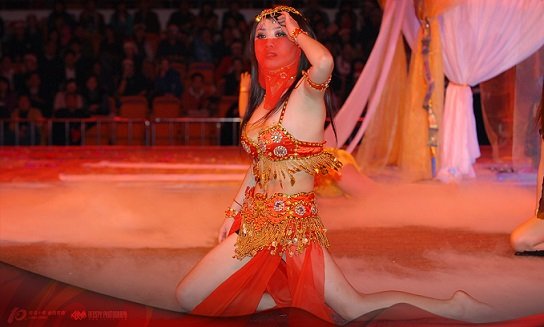

I can’t prove this is true, but the secretary I worked closest with told me that their boss has a policy of only hiring beautiful girls, because then the men would like coming to work every day. From what the boys tell me, they do. What a great country, I thought. What a great company. What a great policy. And I get to work here. But those bastards who are full time have better access to the virtually unlimited pool of brilliant, funny and gorgeous babes than I do. Damn! Too bad I have a rule against dating students.
No geeky tech girls here. Programmers, testing engineers, database managers, UI designers, software engineers, secretaries, all of them, comprised an office block full of non-stop beauty pageant wonder, the proof being the photos above. The secretaries get higher salaries than engineers at some other companies.
The men at Tencent know well the paradise they spend their work weeks in. Employee morale is among the highest I’ve seen in 13 years of corporate training. The boys are cool and sly, and girls know how to use their feminine powers. The banter, the hilarity, the flirtatious fun, and the open acceptance of it all makes this place a sheer joy to spend working hours.
Thus began my stretch at Tencent moving from gig to gig and often running two or three at a time in various departments or for various teams. There was a time when I was turning down other corporate contracts because I was spending all my time at Tencent, and loving it!

They are certainly the most professional Chinese company I’ve had the pleasure to work with when it came to handling business, whether it was scheduling, developing content or billing, everything was handled smoothly and completed on time.
It was here that I met Albee. She attended the weekly English corner every Thursday night and was a bright, cheerful and diligent student. Still is as a matter of fact.
In doing the research for this book, which was originally started for the Binnall of America show, I asked my students if they had any real ghost stories they wanted to share. Now, when you ask most Chinese people nowadays if they believe in ghosts, they will say no. But it’s not so simple.
Every Halloween I treat my classes to one of my real life ghost stories, a few of which appear here. But before I begin, I like to get an idea of what the general class view on ghosts is. A typical scenario might go like this: I poll a class by asking who believes in ghosts. No one raises their hand. Then I ask who’s afraid of ghosts. Everyone raises their hand!
“Wait,” I protest. “If y’all don’t believe in ghosts, how can you be scared of them?”
“Because maybe it’s true,” they reply.
Here’s a couple of Halloween classes. One at a toy company and one at Tencent.
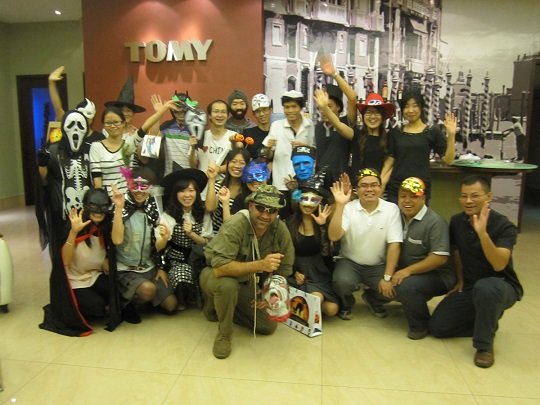
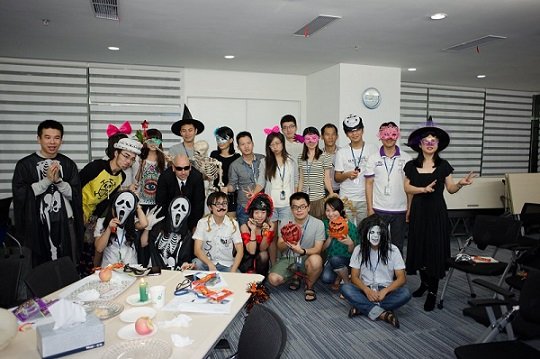
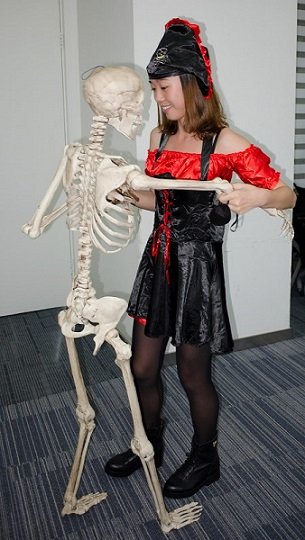
I also have a lot of students who claim they do not believe in ghosts, but as soon as you start to tell them a ghost story, they become terrified and ask you to stop. They won’t be able to sleep if you continue. In my Halloween classes, when I begin the ghost story, there are always a few students who have to get up and leave, even though moments before they assured me they don’t believe in ghosts. And even though they left just as the story got underway, they sometimes message me the next day and say they couldn’t sleep the night before because of my story. Which they didn’t even hear!
In fact I had that very conversation today just two hours ago with a new student. I asked her if she had any stories of high strangeness in China—ghosts, mysterious creatures, UFOs, or the like. She told me she didn’t think any of the stories were real and offered a famous old collection of ghost stories from ancient times that were made up by the author.
I told her I wasn’t interested in those kinds of stories and proceeded to tell her about one of the “real” ghost stories I had. She immediately stopped me and told me it was too scary and that she wouldn’t even be able to sleep if I continued. However, she did turn me on to a good mysterious ancient civilization that I’ll cover in a later chapter.
Albee, however, delivered in spades and way above her English level. She must have spent weeks meticulously translating her tale for me.
When she was seven years old, her home village was Cheng Yang Xing Ping (城阳兴平) which is near Xi’an, China’s ancient capitol. Here are a few pictures of it.
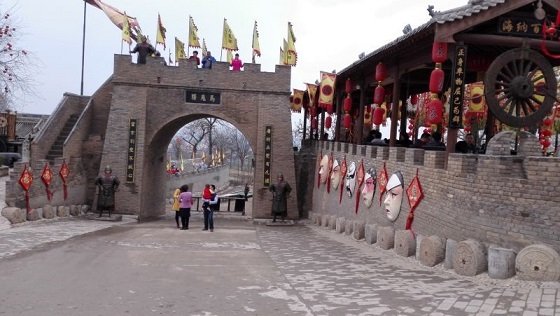


A neighbor of hers married a young woman who was from out of town. After two years of marriage, the girl was blessed with two children.
One night she had a dream that she would become suddenly ill and die. She told her mother-in-law about it. Her mother-in-law didn’t talk to anyone else about it, thinking it would be bad luck to do so. But it didn’t help. Just as she dreamed, the young woman died 3 days later, leaving behind her husband and two children. Since she died in the hospital outside her village, the old women of the village would not let her body back into the village for the funeral. This is considered very bad luck to let an out of town stranger back into your town after they die.
One day, several years later, one of the local women’s child was playing with the deceased woman’s child when the child was abused by the local woman. Albee didn’t explain exactly what sort of abuse due to the language difficulty between us, but it was some sort of beating. All of a sudden, the woman’s own child was stricken with something, couldn’t speak, and couldn’t recognize anyone including his own family. They rushed the child to the hospital where the doctor took his pulse. This is a Chinese medicine term that refers to diagnosing a person by taking the three pulses. There are three pulses at three different levels, and each reveals something different. Sometimes it is called the nine pulses, but there are three positions (cun-寸, guan-关 & chi-尺) at three depths (fu-浮, zhong-中, chen-沉), so it is 3 x 3, or nine pulses, 18 if you count both wrists. Western medicine doesn’t use this method, but having experienced this form of diagnosis myself, I can assure you it works.
After taking his pulse, the doctor announced that the child would not live to see tomorrow!
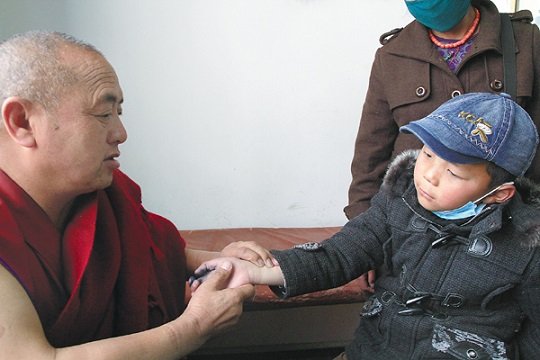
Word spreads quickly, and Albee, who is about 7 years old when all this happened, became terrified. She tied a red cloth around her neck and went to a local peach orchard where she broke a branch off a peach tree and constantly held it close to her. Peach wood is used against ghosts in China the way stakes of holly are used against vampires in the West.
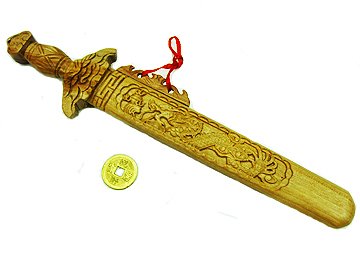
A Taoist priest is summoned who says that the ghost of the deceased woman is causing the problem. He manages to talk the ghost into not killing the child yet. He also informs the woman who beat the dead woman’s child that he would not kill the ghost either. The ghost was only trying to protect her child. So he ruminates and decides that the best course of action is to apologize to the child who was beaten and the ghost in an official Taoist ceremony.
They go to the temple and there are some kind of special arrangements. One parent of the kid has to stand in one doorway and the other parent in the other. The abusive woman has to apologize personally to the kid she beat as well as to the ghost. How this ceremony went down exactly Albee couldn't remember.
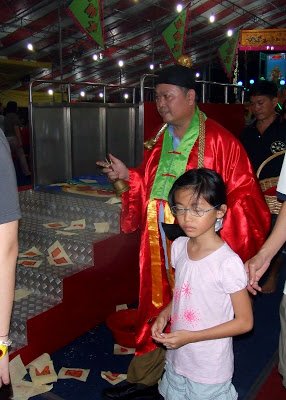
After the whole thing is over, the stricken child starts to recover and within a few days was back in full health.
This was witnessed by my student and all the people of her village.

images (1-2,3&10-4 to 9-11-18-19-20-21, 15 to 17 from Albee, rest mine)
